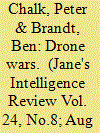| Srl | Item |
| 1 |
ID:
115437


|
|
|
| 2 |
ID:
165307


|
|
|
|
|
| Summary/Abstract |
The quality of studies drawing primary data from terrorists and violent extremist respondents varies substantially, with this body of literature exhibiting a variety of repeating methodological issues. For instance, researchers often uncritically accept interviewee responses at face value, overlook key theoretical insights, downplay or neglect potentially important explanatory variables, fail to offer sufficient information about their sampling methods, and deliver findings with inferences beyond what their sample allows. Indeed, certain studies demonstrate a number of these flaws, including the United Nations Development Programme's recently published Journey to Extremism in Africa report. Within this context, the dual purposes of this article are (a) to discuss ways to overcome these specific methodological problems, and (b) to provide broader guidance for face-to-face research with such respondents.
|
|
|
|
|
|
|
|
|
|
|
|
|
|
|
|
| 3 |
ID:
120929


|
|
|
|
|
| Publication |
2013.
|
| Summary/Abstract |
The purpose of this article is to inform the debate about strategies and options for countering online radicalization within the U.S. domestic context. Its aim is to provide a better understanding of how the Internet facilitates radicalization; an appreciation of the dilemmas and tradeoffs that are involved in countering online radicalization within the United States; and ideas and best practices for making the emerging approach and strategy richer and more effective. It argues that online radicalization can be dealt with in three ways. Approaches aimed at restricting freedom of speech and removing content from the Internet are not only the least desirable, they are also the least effective. Instead, government should play a more energetic role in reducing the demand for radicalization and violent extremist messages-for example, by encouraging civic challenges to extremist narratives and by promoting awareness and education of young people. In the short term, the most promising way for dealing with the presence of violent extremists and their propaganda on the Internet is to exploit their online communications to gain intelligence and gather evidence in the most comprehensive and systematic fashion possible.
|
|
|
|
|
|
|
|
|
|
|
|
|
|
|
|
| 4 |
ID:
141296


|
|
|
|
|
| Summary/Abstract |
Why and how do individuals residing in relatively peaceful and affluent Western societies come to embrace extremist ideologies that emanate from distant places? We summarize the most recent empirical literature on the causes and dynamics of radicalization, and evaluate the state of the art in the study of Islamist homegrown extremism in the West. We propose a theoretical synthesis based on four factors that come together to produce violent radicalization: personal and collective grievances, networks and interpersonal ties, political and religious ideologies, and enabling environments and support structures. We propose adopting a “puzzle” metaphor that represents a multifactor and contextualized approach to understanding how ordinary individuals transform into violent extremists. We concluded with three recommendations to strengthen the empirical foundations of radicalization studies.
|
|
|
|
|
|
|
|
|
|
|
|
|
|
|
|